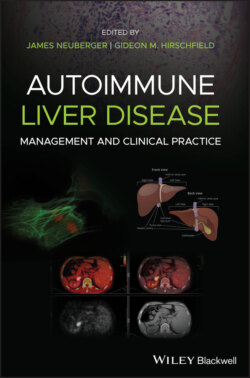Читать книгу Autoimmune Liver Disease - Группа авторов - Страница 65
Sex and Sex Hormones
ОглавлениеMost autoimmune diseases have a female predilection [1,18]. However, PSC is a notable exception among AILDs (Table 2.1). Sex is genetically binary and imprinting of XX female and XY male genomes occurs in all cells from embryogenesis throughout life [18]. Both innate and adaptive immune cells have sex hormone receptors, and sex hormones contribute to the development and activity of the immune repertoire (Figure 2.1). Yet it is unclear whether female predominance in autoimmune diseases reflects regulatory mechanisms related to sex‐linked genes, sex‐specific hormones or a combination of both. Females normally produce higher titers of antibodies, more autoantibodies and greater cell‐mediated immunity to infections and immunization than do normal males. In addition, there is a gender bias in AIRE expression in the thymus, which may impact deletion of autoreactive clones and formation of nTregs and Bregs. Estrogen levels are also immunoregulatory: high levels inhibit CD4 Th1‐mediated cellular responses and promote CD4 Th2 antibody‐mediated responses. Prolactin, progesterone and testosterone also regulate immune responses by modulating expression of estrogen receptors and altering cytokine secretion. However, the effects of estrogen and other sex hormones in adult women do not explain the female predilection for autoimmunity in children or elderly adults. Postulated explanations include skewed X chromosome activation, X monosomy, and microchimerism. Beginning during embryogenesis and continuing through life, either the maternal or paternal X chromosome within each cell is inactivated, forming a Barr body adjacent to the nucleolus. Thus, females are a mosaic of two cell types, based on the parental source of the active X chromosome. Skewing of X inactivation varies widely and increases with age. Thus, some X‐linked autoantigens might theoretically escape central or peripheral tolerance. The proximity of Barr bodies to the nucleolus suggested that they may interact to expose cryptic autoantigens. X monosomy might promote autoimmunity by preventing tolerance to autoantigens encoded by both X chromosomes. Entry of fetal hematopoietic stem cells into the maternal circulation during pregnancy can cause fetal–maternal microchimerism that could promote loss of self‐tolerance.
